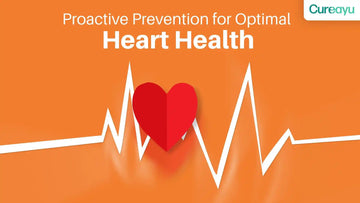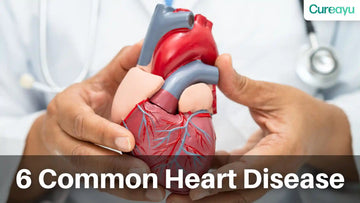Heart disease remains a formidable challenge in global health, being the leading cause of death for both men and women. However, the potential for prevention and control gives us hope. This guide is crafted to demystify the aspects of heart disease, emphasizing the power each individual holds in reducing risk through lifestyle choices. With a rich blend of scientific insight and practical advice, we aim to arm individuals with the tools they need to not just avoid heart disease but to thrive with excellent cardiovascular health.
Adopting heart-healthy behaviors doesn't demand a complete overhaul of your life. Simple, consistent changes and informed choices can exponentially improve your heart health. This guide acts as your compass, directing you toward a heart-healthy path amidst the chaotic and often confusing world of health advice.
Also Read: High Blood Pressure Symptoms: Recognizing Early Signs to Protect Your Health
What Is Heart Disease
Heart disease refers to a spectrum of different heart-related issues, each one with distinct mechanisms but often with overlapping lifestyle causes and measures for prevention. Key among these are:
Coronary Artery Disease (CAD): The development of atherosclerosis or plaque buildup in coronary arteries reduces blood flow, causing chest pain, shortness of breath, and heart attacks.
Arrhythmias: Heart rhythm disorders can be benign or life-threatening, impacting the heart's ability to effectively pump blood.
Congestive Heart Failure: A progressive condition often following CAD or high blood pressure, it denotes the heart's diminished capacity to fill with or eject blood.
Heart Valve Complications: Valves act as traffic directors for blood flow through the heart. When diseased, they can leak or obstruct normal blood flow, overworking the heart and reducing its efficiency.
Main Culprits For Heart Disease
Unhealthy diets, physical inactivity, smoking, excessive alcohol use, obesity, high cholesterol, high blood pressure, and diabetes form the vanguard of risk factors contributing to heart disease.
Unhealthy Diet: A diet high in saturated fats, trans fats, salt, and sugar not only contributes to weight gain but also paves the way for high cholesterol and hypertension, which are direct risk factors for heart disease.
Lack of Physical Activity: Cardiovascular fitness is integral to heart health. Sedentary habits can quickly lead to weight gain and deteriorating heart function.
Tobacco Use: Each puff of tobacco introduces harmful substances that inflame the lining of arteries and exacerbate the formation of plaques, leading to heart attacks and strokes.
High Blood Pressure: Often asymptomatic, untreated high blood pressure steadily damages the heart and blood vessels, significantly increasing the risk of heart disease.
Diabetes: Poorly controlled blood sugar accelerates atherosclerosis, leading to a higher chance of heart attacks.
Also Read: Top 15 Heart Healthy Foods
Precautions For Heart Attack
Guarding against heart attacks entails adopting a vigilant approach to lifestyle, dietary habits, and risk factor management.
Balanced Diet: Consuming a balanced diet, abundant in fibrous fruits, leafy vegetables, and whole grains, can mitigate the risks associated with an unhealthy diet.
Physical Activity: Engaging in regular, heart-pumping exercise reduces the likelihood of developing high blood pressure, obesity, and high cholesterol.
Stress and Sleep Management: Elevated stress levels and poor sleep both contribute to heart attack risk. Develop strategies for managing stress and prioritize establishing a healthy sleep routine.
Tobacco and Alcohol: Quitting smoking and limiting alcohol intake can drastically improve cardiovascular health, reducing heart attack risk.
How To Prevent Heart Attack
Regular exercise, a balanced diet, and wise health choices are essential to heart attack prevention. Bolster these with periodic health check-ups to monitor key heart health indicators.
Healthy Eating Habits: Select foods that improve heart health, and learn to manage portion sizes to maintain a healthy weight.
Exercise for Heart Health: Regular physical activity cannot be understated; beyond weight management, it benefits every aspect of heart health.
Risk Factor Modification: Address and manage individual risk factors like high cholesterol, high blood pressure, obesity, and diabetes through lifestyle changes and medications when necessary.
Also Read: Low Bp Symptoms in hindi : बीपी कम होने के लक्षण, कारण और उपाय
How To Reduce The Risk Of Heart Attack
Reducing heart attack risk can often involve additions to your diet, including the incorporation of natural supplements known to benefit heart health.
Incorporate Natural Supplements: Cureayu Heart Tone Capsules, Heart Tone Capsules are the best cholesterol treatment and capsule for high cholesterol. These capsules include a potent combination of all-natural ingredients such as Arjuna, Amla, Tulsi, Giloy, Dalchini, Garlic, Ginger, Parwal, and Gotu Kola, which have been shown to effectively lower cholesterol and triglyceride levels. Heart Tone Capsules are a renowned Ayurvedic treatment for blood pressure control. Heart Tone Capsules are a natural and comprehensive way to reduce cholesterol, maintain normal blood pressure, and improve overall cardiovascular health.
Heart-Healthy Diet: Proactively include foods rich in omega-3 fatty acids and antioxidants, and consider natural supplements like Cureayu Heart Tone Capsules to help manage cholesterol and blood pressure.
Routine Medical Screenings: Ensuring that heart disease markers like cholesterol and blood pressure are within healthy ranges can significantly reduce the risk of heart attack. Regular check-ups can catch issues early and help you take proactive steps.
Conclusion
The journey of maintaining heart health is ongoing, requiring diligence and commitment to healthy living. A wealth of research highlights the effectiveness of diet, exercise, and supplementary measures in preserving heart health. By integrating strategies like the usage of supplements, such as Cureayu Heart Tone Capsules, into our lifestyle, alongside medical screenings and education, we infer a proactive defense against heart disease. This guide offers you a blueprint to navigate the complexities of cardiovascular wellness, empowering you to take control and secure a heart-healthy future.












